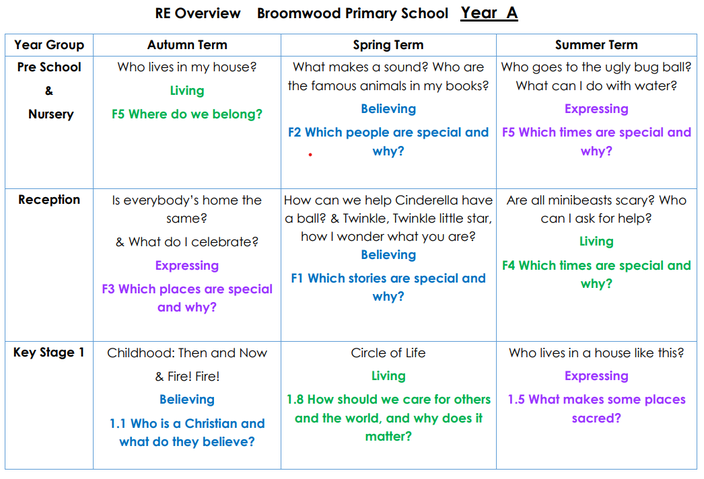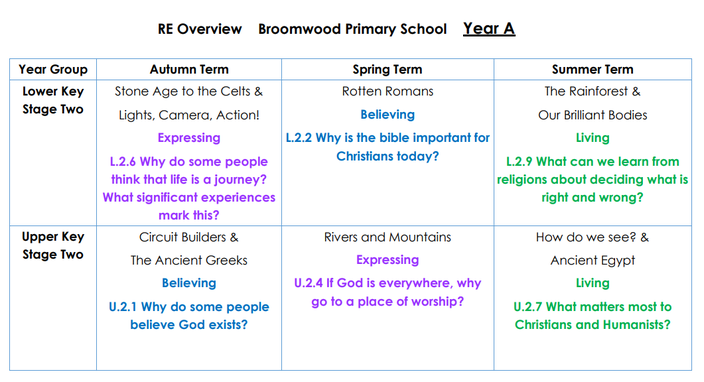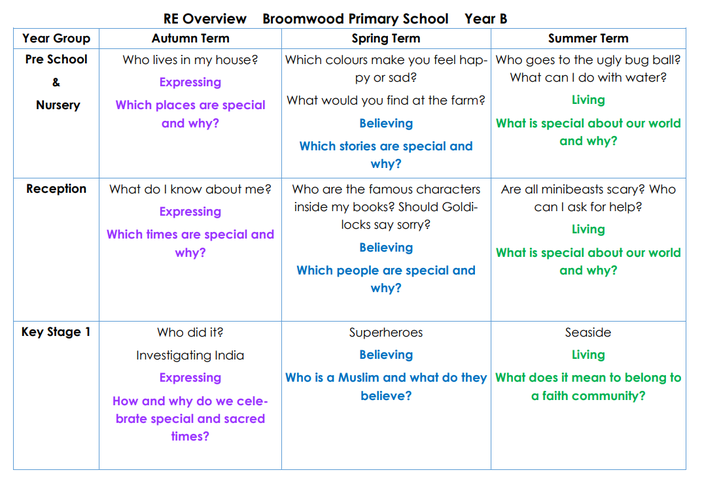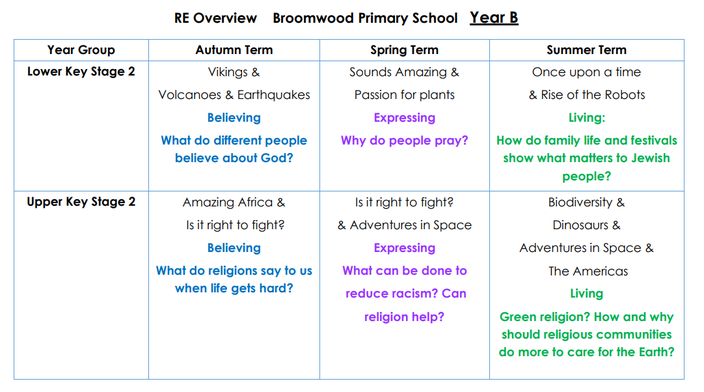Religious Education
Rationale
Our curriculum for Religious Education (RE) is designed to follow the agreed syllabus as advised by the Standing Advisory Council on Religious Education (SACRE) within the Local Education Authority for Trafford. As a compulsory part of the curriculum, RE at Broomwood Primary covers a broad range of religions and worldviews in which children encounter living faiths and traditions. In adopting this syllabus we recognise our school community as vibrant and unique with much diversity of religion and beliefs. The local area includes large communities of Christians, Muslims, Hindus and Sikhs and smaller groups of other significant faiths and worldviews -including non-religious worldviews. RE taught using this syllabus allows learners to share their experiences and to learn from one another about the religions and beliefs within our community. Within RE, children are able to explore our schools core values; respect, commitment, nurturing, togetherness and welcoming, which are taught in alignment with British Values. We believe these values prepare the children for active citizenship in a diverse and rapidly changing world. The main purpose of RE as proposed by the SACRE is as follows:
“The principal aim of RE is to engage pupils in systematic enquiry into significant human questions which religion and worldviews address, so that they can develop the understanding and skills needed to appreciate and appraise varied responses to these questions, as well as develop responses of their own.”
Intent
Our RE curriculum is designed to ensure that children are taught key concepts and ideas of religious and non-religious worldviews in a progressive manner. This allows children to build on prior learning and teachers are able to based on learning that has gone before. By revisiting different concepts our children can develop a complex schema of RE via the three main strands : Believing, Expressing and Living. Within these three strands, children develop their substantive knowledge of key concepts and ideas about religious and non-religious worldviews. These concepts are explored from different perspectives, encouraging children to understand how different people may respond to key questions. Our RE syllabus provides space for pupils to articulate their own ideas, engage with their own reasoning and learn how to agree or disagree respectfully. The units of RE are built around key questions which allow the children to develop their disciplinary knowledge of RE via discovering (EYFS), exploring (KS1) and connecting (KS2). The RE curriculum is designed to accessible for all learners, a multi-sensory approach is used to ensure learners of all abilities are able to access the substantive knowledge via practical lessons. These often include visitors from different faiths and worldviews, the use of religious artefacts, music and art. In accordance with the SACRE the long term plans for Year A and Year B at broomwood Primary School can be found below.
Implementation
In accordance with the SACRE for primary schools in Trafford, our Religious Education (RE) curriculum meets the legal requirements that states that RE must be provided for all registered pupils in state-funded schools in England. In order to deliver the aim and expected standards of the syllabus effectively, children have one hour of RE tuition per week in line with the legal minimum allocation of 5 per cent of curriculum time for RE.
RE is different from assembly time, though children are given opportunities to make links between themes covered during collective worship during their RE lessons. During whole school assemblies’ children are able to explore different celebrations and special occasions from around the world. Throughout the year, we honour different festivals as a school including visitors, trips and practical workshops which are evidenced with photographs in children’s RE books.
RE at Broomwood uses a multi-sensory approach to RE making it accessible to all learners. Within RE, children explore the big unit questions using artefacts, stories, drama and discussions. Where possible, children have experiences of different religious and non-religious visitors who come and share their practises and beliefs with each class. This can include visits from children in other classes who belong to a particular faith group and provides opportunities for sharing knowledge and understanding whilst celebrating the diverse community within our school.
Children’s learning of RE is evidenced in individual books, where their substantive knowledge and understanding is displayed using photographs, written responses and also QR codes which provide video demonstrations of children’s spoken responses. At the end of each unit children in KS1 are recorded giving a spoken response to their big question which can be used to inform teacher assessment in RE. Children are given knowledge organisers and vocabulary mats which are displayed at the beginning of each RE unit, in order to provide support towards children’s understanding of the substantive RE knowledge and spelling/definitions of key words.
Impact
Accordion content




